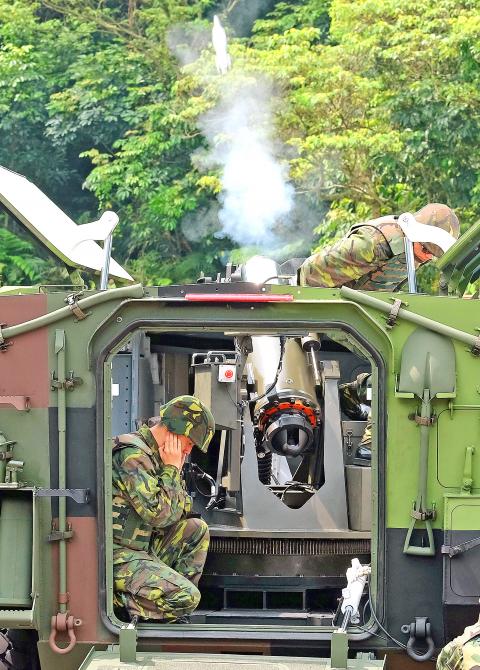The military unveiled a new, locally developed mobile mortar system, along with other locally developed weapons systems and equipment, during a media tour yesterday to demonstrate its efforts to create self-reliant defense capabilities.
The mobile mortar system comes in two versions: One is mounted to a vehicle and the other is designed to be set up on the ground, said Lieutenant Colonel Chen Chien-chung (陳健中) of the 202nd Arsenal at the Ministry of National Defense’s Armaments Bureau, which was responsible for developing the system.
Unlike traditional, manual methods of launching mortars, the system allows personnel to launch mortars through a computerized system “which is completely developed locally,” Chen told reporters during a tour of the 202nd Arsenal’s Taipei unit.

Photo: AFP
The system is very easy to operate; as long as you can play video games, you will know how to operate it,” he said.
The system can fire the 81mm and 120mm mortar shells used by the military, he said.
Advantages of the system include better aim stability and faster deployment, he said.
“I feel proud that we developed the system on our own,” Chen said, adding that nations such as Israel, South Africa and the US have similar systems.
The system includes a function to simulate the firing of a mortar. During the tour, a five-member group from the 202nd Arsenal demonstrated a simulated firing of mortars through the system, which targeted Taipei 101, about 3.8km away.
It took about five years to develop the system, Chen said, adding that the project started in 2010 in line with the ministry’s policy of building a self-reliant defense force.
“Locally developed systems are less expensive” than those acquired from foreign countries, he said.
The system has passed initial tests and has participated in a live-fire drill, Chen said, adding that further tests are to be held early next year.
Also showcased in Friday’s tour was a weapons platform that includes an electric server and fire control system. The main feature of the system, developed by the 202nd Arsenal and seen in previous air shows, is a 40mm automatic grenade launcher.
Among the other items on display was a gas mask designed by the arsenal that it said better fits the faces of Taiwanese.
Under the Armaments Bureau’s Materiel Production Center, the 202nd Arsenal is responsible for producing artillery and ammunition; anti-nuclear, biological and chemical equipment; and batteries for the military.
It has three units, one in Taipei and two in Yilan County.

The disruption of 941 flights in and out of Taiwan due to China’s large-scale military exercises was no accident, but rather the result of a “quasi-blockade” used to simulate creating the air and sea routes needed for an amphibious landing, a military expert said. The disruptions occurred on Tuesday and lasted about 10 hours as China conducted live-fire drills in the Taiwan Strait. The Civil Aviation Administration (CAA) said the exercises affected 857 international flights and 84 domestic flights, affecting more than 100,000 travelers. Su Tzu-yun (蘇紫雲), a research fellow at the government-sponsored Institute for National Defense and Security Research, said the air

Taiwan is to commence mass production of the Tien Kung (天弓, “Sky Bow”) III, IV and V missiles by the second quarter of this year if the legislature approves the government’s NT$1.25 trillion (US$39.78 billion) special defense budget, an official said yesterday. Commenting on condition of anonymity, a defense official with knowledge of the matter said that the advanced systems are expected to provide crucial capabilities against ballistic and cruise missiles for the proposed “T-Dome,” an advanced, multi-layered air defense network. The Tien Kung III is an air defense missile with a maximum interception altitude of 35km. The Tien Kung IV and V

Trips for more than 100,000 international and domestic air travelers could be disrupted as China launches a military exercise around Taiwan today, Taiwan’s Civil Aviation Administration (CAA) said yesterday. The exercise could affect nearly 900 flights scheduled to enter the Taipei Flight Information Region (FIR) during the exercise window, it added. A notice issued by the Chinese Civil Aviation Administration showed there would be seven temporary zones around the Taiwan Strait which would be used for live-fire exercises, lasting from 8am to 6pm today. All aircraft are prohibited from entering during exercise, it says. Taipei FIR has 14 international air routes and

Taiwan lacks effective and cost-efficient armaments to intercept rockets, making the planned “T-Dome” interception system necessary, two experts said on Tuesday. The concerns were raised after China’s military fired two waves of rockets during live-fire drills around Taiwan on Tuesday, part of two-day exercises code-named “Justice Mission 2025.” The first wave involved 17 rockets launched at 9am from Pingtan in China’s Fujian Province, according to Lieutenant General Hsieh Jih-sheng (謝日升) of the Office of the Deputy Chief of the General Staff for Intelligence at the Ministry of National Defense. Those rockets landed 70 nautical miles (129.6km) northeast of Keelung without flying over Taiwan,